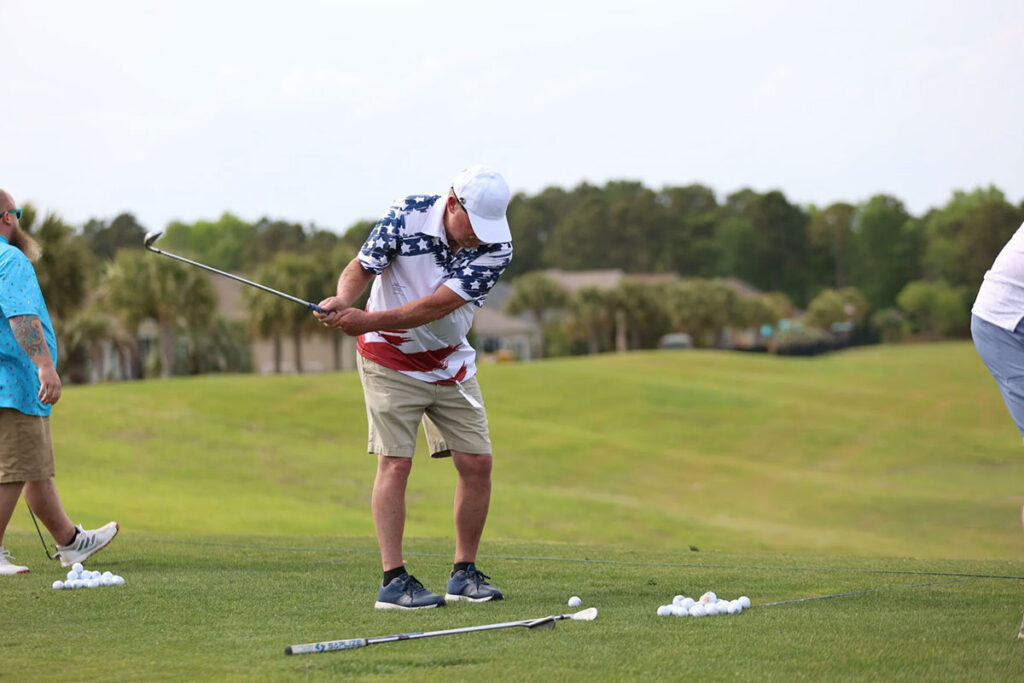Article originally posted on MyHorryNews.com.
Mischelle Choinski looked out at a bright green driving range on a sunny, spring afternoon.
Behind her was a group of local disabled veterans learning the game of golf, working on chipping, putting and driving.
Sounds of clubs being smacked into golf balls overtook the background.
At times, the sound of celebration between good shots or groans after poor ones drowned out Choinski’s voice as she spoke. But that was hardly an issue. The environment was one that she loved to be around.
Choinski, a retired U.S. Marine captain, has terminal cancer.
She was recently transitioned to hospice care after battling cancer and other illnesses for many years, and she has since had to sift through her thoughts regarding life.
At times, they have become difficult to work through.
“Personally, I didn’t know why God was keeping me on Earth,” Choinski said. “A lot of doctors didn’t understand why I was still living. I kept trying to understand what was He leaving me with? What did He want me to do?”
In addition to her military career, Choinski had a successful executive business career. After her diagnosis and throughout her battle, she slowly began to “have things taken away.”
But the one thing that has yet to be taken away from Choinski’s journey is her competitive spirit. And thanks to the efforts of local nonprofit Project Golf and its involvement in the PGA HOPE program, Choinski is still chasing after her purpose — helping and serving others.
Even in a wheelchair and in the midst of hospice care, she shines a bright light of encouragement wherever she goes.
A real-world hope
PGA HOPE — a charitable endeavor of the Carolinas PGA and PGA of America — is a program that turns dark times bright.
HOPE stands for “Helping Our Patriots Everywhere.”
Choinski is one of those Patriots.
The program introduces golf to disabled veterans to improve and enhance their physical, mental, social and emotional wellbeing. The program offers a six- to eight-week course, taught by local PGA professionals, to disabled veterans looking for an outlet to pick up a new hobby, be around fellow veterans and get their mind shifted in a positive direction.
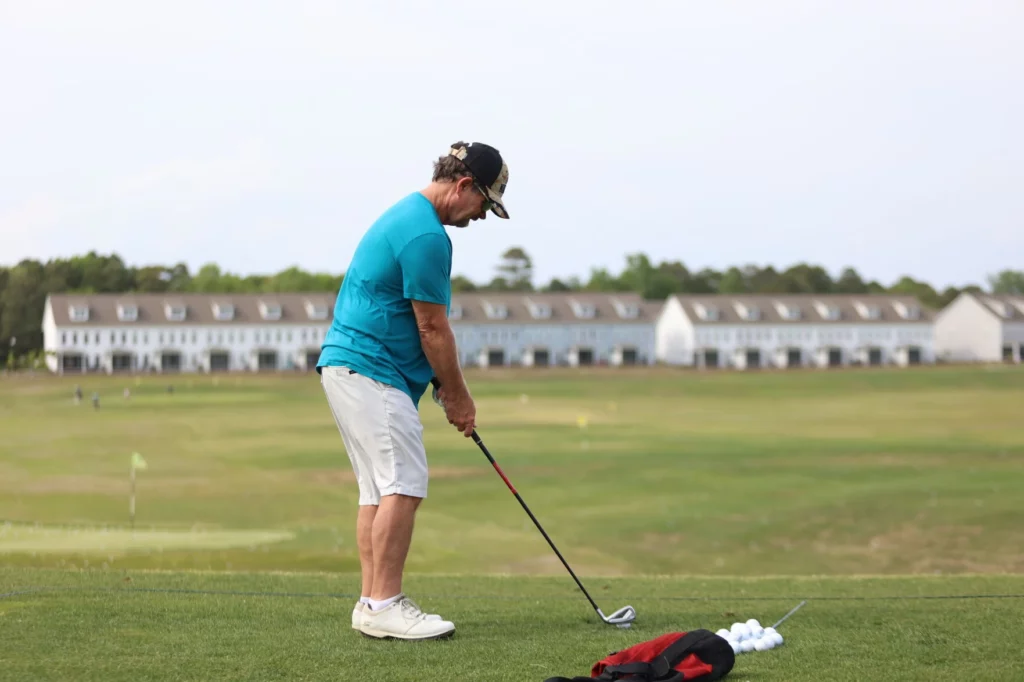
When Choinski started with the program, she was not in hospice care, but her failing physical health made it increasingly challenging to play the game she loves.
But with Project Golf Myrtle Beach’s commitment to go above and beyond — even to the point of coordinating the use of a paramobile golf cart to allow Choinski to play the game without help of her legs — she was able to find a new way forward.
“Golf was one of my favorite sports, and I used to play it a lot. And then all the sudden, I couldn’t play at all,” she said.
“When I came out here, I was losing my independence. And then suddenly, I got some level of independence back. I don’t think anyone can imagine how that feels. To have everything ripped from you. From being a type-A executive to, all the sudden, these different things are taken away from you, one thing at a time. It became my legs, and then it became my whole body… But when I hit the ball it was very emotional. Very emotional.”
That moment is the goal of the PGA HOPE program.
Director Angel Diaz says seeing Choinski’s experience, and many others like hers, has made Project Golf’s efforts worthwhile.
“There is nothing more rewarding than to help a veteran who has given their service to this country,” Diaz said.
“They are trying to find purpose in trying to hit a little white ball. And it’s really cool, because they are really trying to hit that little white ball. And for us, we are focused on their abilities to hit that little white ball so they don’t have to worry about their disabilities. You can’t do both. That’s really what our purpose is here. It’s to help people work on their abilities so they don’t have to work on their disabilities.”
Camaraderie and a new mindset
Gary Schaal, Project Golf’s executive director, has seen a lot of golf instruction at the organization’s facility at the Barefoot Resort in North Myrtle Beach.
PGA HOPE class attendees go through the full experience during classes.
They learn fundamentals like staying down and through the ball.
They chip from the edge of the green, competing with one another as they try to use their newfound skills to get their ball closer than the veteran chipping next to them on their right and left.
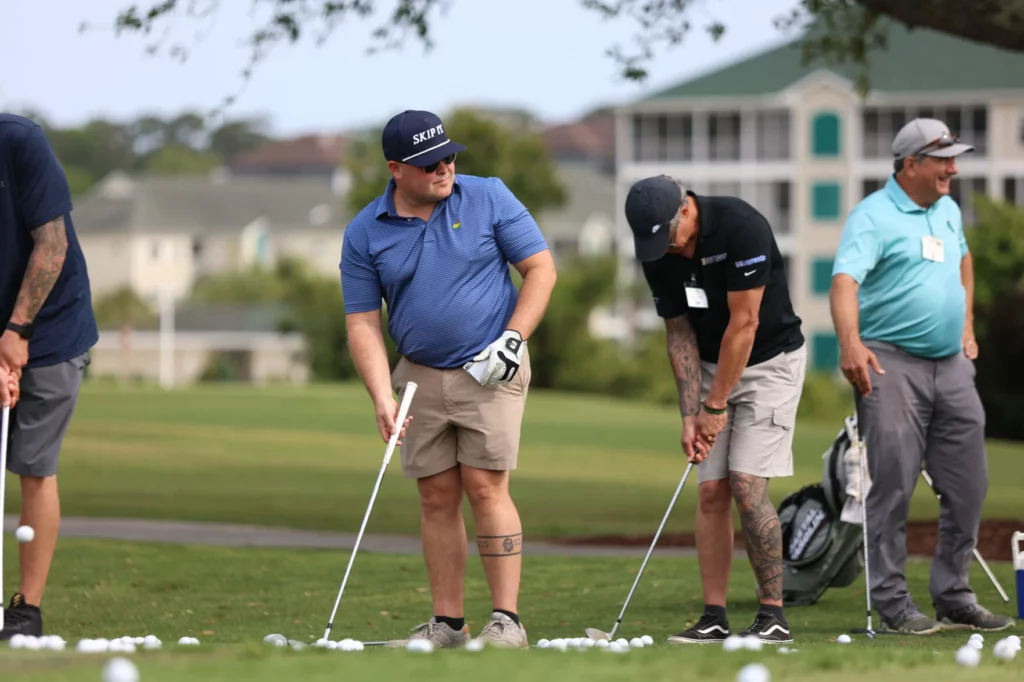
They even sit down in front of local golf instructors from across the area and learn how to prepare and play an 18-hole round. No stone is left unturned when teaching this group of disabled veterans how to navigate the golf world.
But as much as Schaal loves the golf-specific instruction, he’ll likely tell you that the tips and tricks the veterans are taught about the game pale in comparison to the life-changing camaraderie they experience.
He remembers one particular interaction with a veteran’s wife.
“We had a spouse whose husband was missing a right arm and we taught him how to play golf with one arm,” Schaal recalled. “We got a real whippy golf shaft in there, and he got really, really good at it. We were teaching him on Tuesdays and Fridays. [His wife] came up to me when the class was over… She said, ‘Gary, do you know what you’re doing here?’… She told me I didn’t get it. So, I said, ‘Help me. What don’t I get?’
“She said, ‘You teach Tuesdays and Fridays, right?’ I said, ‘Well, yeah.’ She said, ‘Gary, he only gets out of bed on Tuesdays and Fridays.’”
Schaal paused, looked out at the driving range, and then took another breath.
“How many of those stories do you need to get fired up? One,” he said. “That’s all I needed.”
Those types of experiences happen all the time, said Frankie Bianco, a local PGA member who helps instruct the group of veterans new to the game.
Bianco gives golf lessons to dozens upon dozens of golf newcomers.
But what’s his most rewarding work? He says that’s a no-brainer.
“Obviously, I do this for a living,” Bianco said. “I teach. I help a junior, the mom, the dad… But to help a veteran to deal with other things they’re dealing with, it adds something more special to it… [At first], I didn’t really know that I was actually saving lives in a way, but it’s true. And it was actually kind of shocking, because that seriously is the case. If I can get them to come out, hit a golf ball and stop paying attention to the noise in their head… that is definitely a huge deal for me. I love this anyway, but this adds something extra for me. It makes it even better.”
Golf’s way of providing peace
Plenty of hobbies and activities can act as a distraction and a form of therapy. Those involved in the PGA HOPE program know that.
But, the game of golf has a way of offering something just a bit more special.
Veda Nichols, a U.S. Army veteran, went through the program and still can be found at the facility on nights there is a new PGA HOPE class. And given the joy she found through the program, there’s no reason to believe she’d pass up on opportunities to stick around.
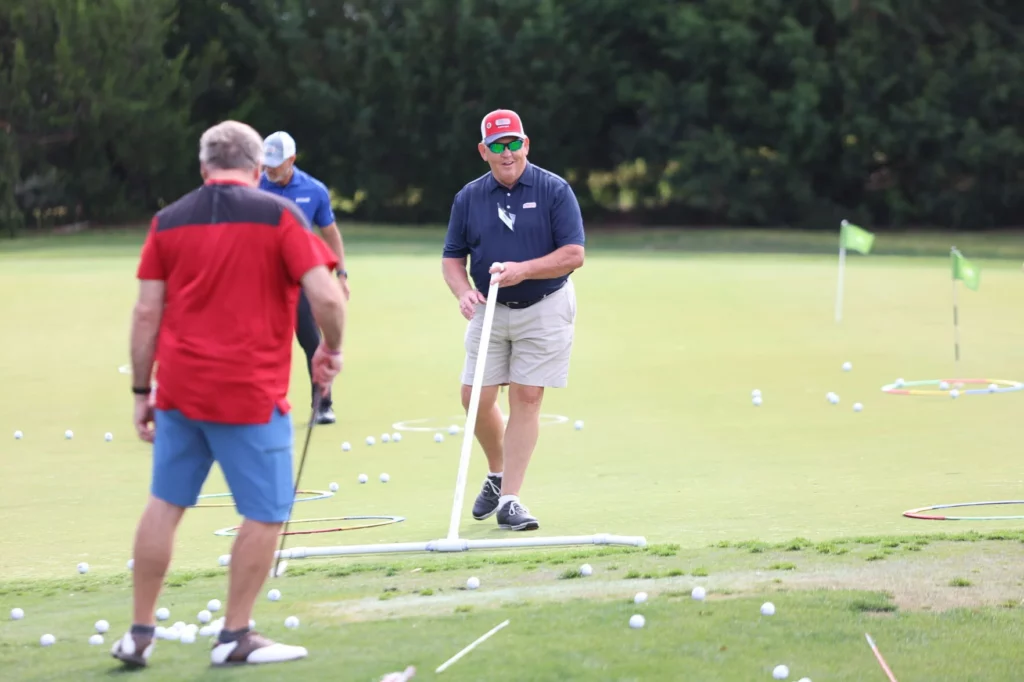
“For me as a veteran, what makes this so special is that it’s an opportunity to be with veterans again,” Nichols said. “It’s the camaraderie. We are accustomed to being with each other in stressful situations in combat and all kinds of other experiences. But this gives us an opportunity to do something we love, or learn something new that we love. It gives us an opportunity to bond and to learn a new skill.
“This is a therapeutic program. Some of us have wounds that are invisible from war and combat and service. This gives an opportunity to heal some of those wounds in a relaxed environment. The people who support us, the PGA pros and the community as a whole, it’s invaluable. We really appreciate that.”
Nichols’ late husband was Henry Nichols, who was a lieutenant colonel in the U.S. Marine Corps. He was elected as the first African-American mayor of Loris in 2016 before he died in 2019 after an extended battle with cancer.
Nichols has seen the benefit of Project Golf’s efforts firsthand. She sings praises of the game of golf. Now a mental health counselor, Nichols jokes about the game’s benefits to those she meets with.
“I tell the guys all the time to tell all of their wives that this is therapeutic, and the counselor said so,” she said with a laugh.
Nichols said the work that is being done through the PGA HOPE program is an unbeatable way to build connections with other veterans and make strides when it comes to connection and overall mental health.
“This is something you have no control over initially,” she said of golfing. “You have to learn this game. It doesn’t matter how good you are. It doesn’t matter your rank, your race, your age, your height. You have to learn how to master this game. You have to take that patience that we learn so much about during our time in the military, and you learn to become one with this course… It’s really therapeutic in every way.”
And as much as the sights of hitting straight drives or sinking chip shots from beyond the green make a PGA HOPE class shine, the real star of the show can be found not on the grass, but on a bunch of bricks.
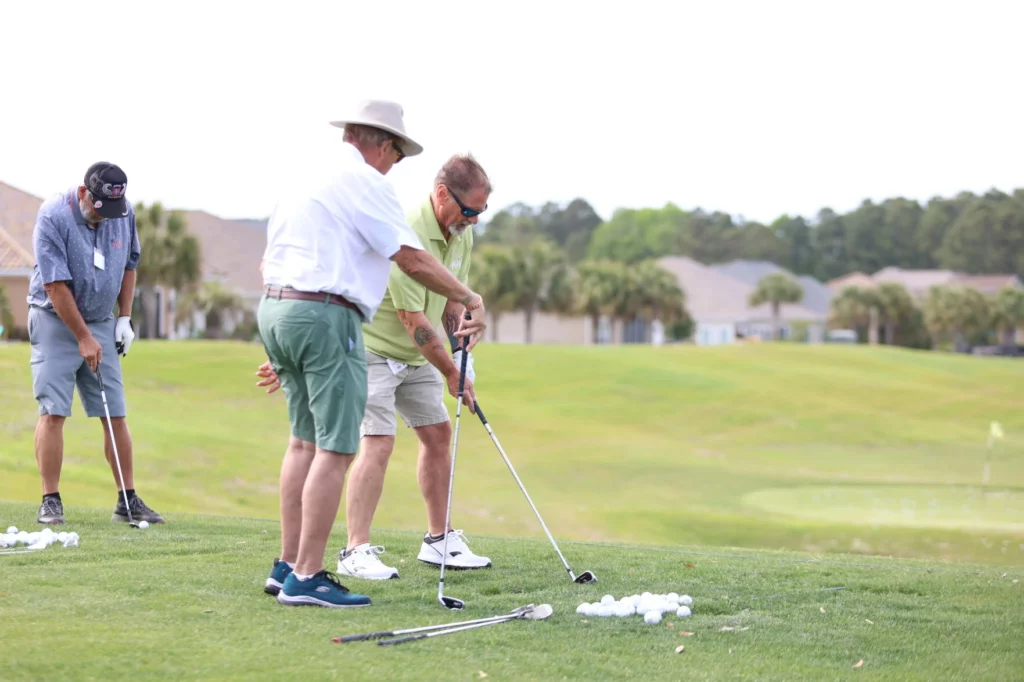
A beautiful, well-manicured patio space sits just in front of the chipping green and practice area.
It has become an outdoor haven for deep conversations. Filled with spaces to sit while overlooking the vast practice range, the patio is a place where connection is prioritized and bonds are formed.
It’s just another element of PGA HOPE classes that helps Schaal and Project Golf leaders know they are on the right track.
“Veterans love being around veterans,” Schaal said. “Particularly the older ones like the Vietnam veterans, they really miss the camaraderie. It’s a different terminology. It’s a different culture. So, we knew we had to build a patio. They want to talk before and after. It’s not just golf… they would really be deprived if they didn’t have it.”
A can-do spirit
As the sun started to set on a recent class, Choinski took some time to reflect.
She has taken time to consider why she is still here, and golf is still very much a part of her life and things she wants to accomplish with the time she has left.
But her remaining goals don’t all center around her.
As she sat in her paramobile golf cart, a full set of clubs sat to her right.
She began to list off three things she continues to prioritize.
“I need to leave more behind for children who are having disability problems. A lot of kids get mislabeled. They get mislabeled … for their speech, their learning, their disabilities. That is one cause that my husband and I have always been very involved in,” she said.
“The second, I had no idea how many [veterans] were dealing with disabilities with mental health… And the third thing is really trying to help out with adaptive golf.”
Choinski’s work through and with the PGA HOPE program has inspired countless people around the Project Golf effort. With a determined spirit and a resiliency that was almost assuredly mastered during her time in the military, she graduated through the PGA HOPE golf program and has continued to hit well-struck and joy-filled golf shots.
Now, even in hospice care, she still finds herself on the green grass, under the sunshine, encouraging others.
Choinski believes in the work of the PGA HOPE program.
She has seen it work in her own life. It’s offered inspiration during a time of physical and mental struggle. Now, she hopes others will take advantage of the program and thrive.
“I really believe that there is nothing that is impossible. I am an example of that,” she said. “We have to really think about those who don’t have a support system. We have to find them a good support system that can help. I’m lucky I have my husband and my kids, but not everybody has that.”
Her message to others, she says, is simple. She hopes those who are still able will never stop swinging.
“Never give up,” Choinski said.
“Can’t is not in the dictionary. ‘C-a-n-apostrophe-t’ is not in the dictionary. Don’t ever say can’t.”

